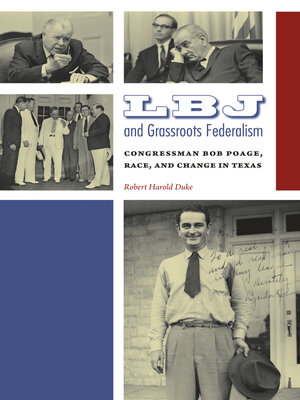LBJ and Grassroots Federalism
ebook ∣ Congressman Bob Poage, Race, and Change in Texas · Centennial Series of the Association of Former Students
By Robert H. Duke

Sign up to save your library
With an OverDrive account, you can save your favorite libraries for at-a-glance information about availability. Find out more about OverDrive accounts.
Find this title in Libby, the library reading app by OverDrive.



Search for a digital library with this title
Title found at these libraries:
| Library Name | Distance |
|---|---|
| Loading... |
LBJ and Grassroots Federalism: Congressman Bob Poage, Race, and Change in Texas reveals the local ramifications of federal policy. Three case studies in the rising career of Lyndon B. Johnson show this in action: LBJ's formative experience as a New Dealer directing the National Youth Administration (NYA) in Texas; his key role as senate majority leader in breaking the deadlock to secure funds for the Lake Waco dam project; and the cumulative effect of his Great Society policies on urban renewal and educational reform among the Mexican American community in Waco.
In each of these initiatives, Bob Poage—though far more politically conservative than Johnson—served as a conduit between LBJ and citizen activists in Poage's congressional district, affirming the significance of grassroots engagement even during an era usually associated with centralization.
Robert Harold Duke's careful analysis in LBJ and Grassroots Federalism also offers a unique insight into a transformational period when the federal government broke down barriers and opened doors to the engagement of African Americans and Mexican Americans in community planning processes and social policy.
In each of these initiatives, Bob Poage—though far more politically conservative than Johnson—served as a conduit between LBJ and citizen activists in Poage's congressional district, affirming the significance of grassroots engagement even during an era usually associated with centralization.
Robert Harold Duke's careful analysis in LBJ and Grassroots Federalism also offers a unique insight into a transformational period when the federal government broke down barriers and opened doors to the engagement of African Americans and Mexican Americans in community planning processes and social policy.







